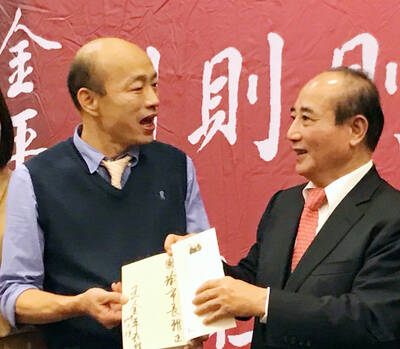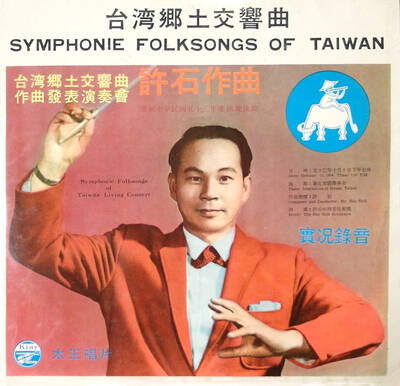This year Spring Scream (春天吶喊) is sweet sixteen. The indie music festival has grown up to become an annual pilgrimage for the country’s college students, party-minded expats and music fans.
The event, which begins tonight and takes place at the Oluanpi Lighthouse National Park (鵝鑾鼻燈塔公園), features some of Taiwan’s rising stars and best indie bands, with nearly 200 acts scheduled to perform on seven stages.
Spring Scream Tiger won’t have a headline
act to match last year’s edition, which featured pop-diva A-mei (阿妹), whose gig organizers say attracted over 5,000 people.
But this year’s lineup is one of the festival’s best, says co-founder Jimi Moe, who believes many of the performers are going to be “future stars.”
If past performance is anything to go by, Moe could be right. Some of Taiwan’s biggest pop acts today — Mayday (五月天), Cheer Chen (陳綺貞) and Sodagreen (蘇打綠) — played at the festival before they achieved big-time success.
Spring Scream has come a long way from its DIY roots. Moe and co-founder Wade Davis, both musicians themselves, started the event in 1995 so their band could play for friends and fans at the beach. The event quickly caught on with local musicians and the expat community, and became a platform for the underground music scene.
In the early years, it used to be that any band with a half-decent demo could land a spot at the festival. This is no longer the case as Spring Scream has grown in popularity and is now considered a rite of passage for any aspiring rock ’n’ roll band in Taiwan. Nowadays, an average of 500 performers apply for the 200 stage slots available.
Performers are chosen with the help of a seven-person “panel,” which includes Moe, Davis and friends and acquaintances representing “different musical tastes.” The panel assigns a score to each band.
But the panel is only one part of the process. Another group plays an important role in deciding who performs at Spring Scream: the festivalgoers.
Spring Scream launched an online voting system last year, but Moe and Davis found that Internet-savvy bands could game the system by having their friends cast repeat votes. And since anyone could vote, the votes didn’t necessarily reflect the opinions of the people who actually went to Spring Scream, said Moe.
This year the festival only accepted votes from “VIPs” — people who bought advance tickets through the festival’s partner, Indievox (www.indievox.com), a Web site where indie bands create their own profile pages from which to sell music.
All bands applying to play this year had to set up an account on Indievox and post samples of their music. Each VIP voter was allowed to choose and rank 20 of their favorite bands on the Spring Scream Web site, which provided direct links to the Indievox band pages.
“We’re really trying to be democratic,” said Moe, who says the voting system helps Spring Scream realize one of its ideals. “Since the very beginning, we’ve always said that the sponsors are the fans. The fans buy the tickets. And we’ve really tried to empower them and give them some say in the matter of what it is that we’re doing.”
The VIP voters will also be deciding cash prizes for the “most anticipated band.” The band that receives the most votes and the highest rankings gets NT$50,000, with additional prizes of NT$10,000 each going to five runners-up.
This year’s performers include pop-punk band Circus (Circus 樂團), hip-hop group Daximen (大囍門), as well as The Clippers (夾子電動大樂隊), a favorite from past Spring Screams. Several international acts are also scheduled, including South Korean rock and hip-hop band Nevada 51, which performed last year, UK hip-hop group Lazy Habits and French house DJ Hanna Hais.
In addition to live music, there will also be food stalls, games and a film stage run by the Urban Nomad Film Fest.
For tips and travel information for this year’s Spring Scream, see Page 14.

Last week the Chinese Nationalist Party (KMT) announced that the legislature would again amend the Act Governing the Allocation of Government Revenues and Expenditures (財政收支劃分法) to separate fiscal allocations for the three outlying counties of Penghu, Kinmen and Matsu from the 19 municipalities on Taiwan proper. The revisions to the act to redistribute the national tax revenues were passed in December last year. Prior to the new law, the central government received 75 percent of tax revenues, while the local governments took 25 percent. The revisions gave the central government 60 percent, and boosted the local government share to 40 percent,

Many will be surprised to discover that the electoral voting numbers in recent elections do not entirely line up with what the actual voting results show. Swing voters decide elections, but in recent elections, the results offer a different and surprisingly consistent message. And there is one overarching theme: a very democratic preference for balance. SOME CAVEATS Putting a number on the number of swing voters is surprisingly slippery. Because swing voters favor different parties depending on the type of election, it is hard to separate die-hard voters leaning towards one party or the other. Complicating matters is that some voters are

Sept 22 to Sept 28 Hsu Hsih (許石) never forgot the international student gathering he attended in Japan, where participants were asked to sing a folk song from their homeland. When it came to the Taiwanese students, they looked at each other, unable to recall a single tune. Taiwan doesn’t have folk songs, they said. Their classmates were incredulous: “How can that be? How can a place have no folk songs?” The experience deeply embarrassed Hsu, who was studying music. After returning to Taiwan in 1946, he set out to collect the island’s forgotten tunes, from Hoklo (Taiwanese) epics to operatic

Five years ago, on the verge of the first COVID lockdown, I wrote an article asking what seemed to be an extremely niche question: why do some people invert their controls when playing 3D games? A majority of players push down on the controller to make their onscreen character look down, and up to make them look up. But there is a sizable minority who do the opposite, controlling their avatars like a pilot controls a plane, pulling back to go up. For most modern games, this requires going into the settings and reconfiguring the default controls. Why do they